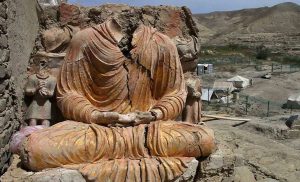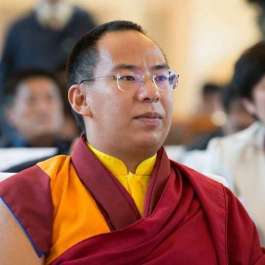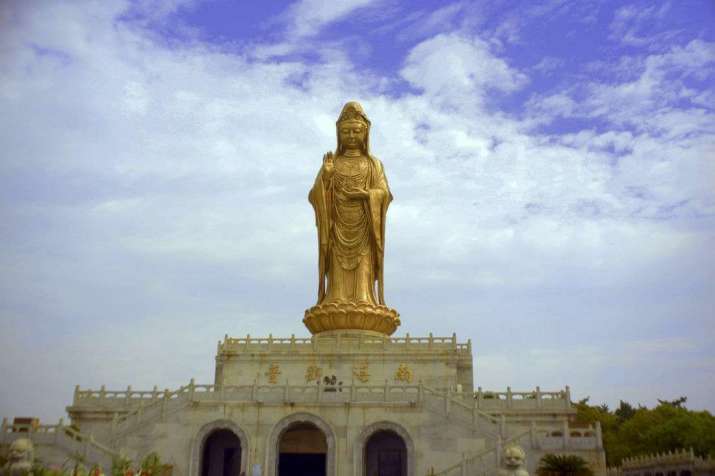
Amid an avalanche of objections from furious monks, China’s securities market regulator has put a hold on plans for an IPO launch for a tourism venture associated with Putuo Shan—one of four sacred Buddhist mountains in China—noted for its numerous temples and golden statues of the bodhisattva Guan Yin.
According to a notice from the China Securities Regulatory Commission (CSRC), Putuo Shan Tourism Development Co. (PTD) has withdrawn its IPO application following a months-long campaign by Buddhist monks, who said the share offering was not in compliance with new rules issued in November last year by the State Administration of Religious Affairs protecting religious sites from exploitation.
Putuo Shan (or Mount Putuo), one of China’s Four Great Mountains of Buddhism,* lies at the center of an island in the East China Sea, some 32 kilometers from Shanghai. Named after Mount Potalaka, the mythical abode of the bodhisattva Avalokiteshvara, known in Chinese as Guan Yin, Putuo Shan has been a pilgrimage site for more than 1,000 years.
Traditionally there were three main temples on Putuo Shan: Puji Temple, founded in 916, Fayu Temple, founded 1580, and Huiji Temple, founded in 1793. Now there are now in excess of 30 major temples on and around the mountain, as well as the Institute of Buddhism, one of the largest Buddhist academic institutes in China.
PTD, which is owned by the government of Zhejiang Province and local government asset-management companies, had planned to list the assets it controls around Putuo Shan to raise funds for a range of tourism-focused infrastructure, including car parking, a spa facility, and cable cars.
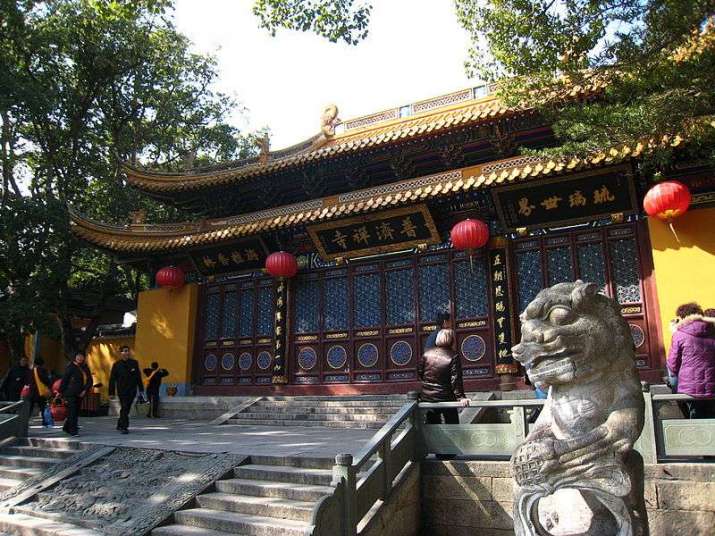
Irene Lok, a researcher at Chinese University of Hong Kong’s Centre for the Study of Humanistic Buddhism hailed the decision to block the IPO as a rare victory in the battle against the commercialization of China’s Buddhist sites. “This is all run like a business now,” she said. “Buddhist sites like these are 90 per cent commercial nowadays.” (Financial Times)
The government-backed Buddhist Association of China (BAC) had campaigned against the IPO for several months, lableing PTD’s planned IPO as damaging to society and the development of Buddhism in China. The government recently introduced legislation that prevents the “marketing of faith,” however, some Buddhists feel the regulatory changes come too late, as a number of religious sites in the country are already controlled by commercial interests—a symptom of what some view as the commercialization of Buddhism. Two of the Four Great Mountains of Buddhism have already had publicly listings: Emei Shan in 1997 and Jiuhua Shan in 2015.
“Going public in the name of faith is the sorrow of all society,” the BAC said in a statement. “For the social mentality of the Chinese people, this will have a deep impact.” (Financial Times)
Other high-profile examples of ecclesiastical entrepreneurship include the controversy-plagued abbot of the famed Shaolin Temple, renowned as a center of Chan Buddhism and for its martial arts tradition.** Since taking charge of the temple in 1999, Shi Yongxin, has launched a series of ambitious commercial projects, including a franchise operation to license the Shaolin name to other temples, and a number of overseas ventures. Other accusations of impropriety against the monk include owning a small fleet of expensive cars, embezzling millions of dollars from a temple company, and funneling cash to a mistress in Australia.
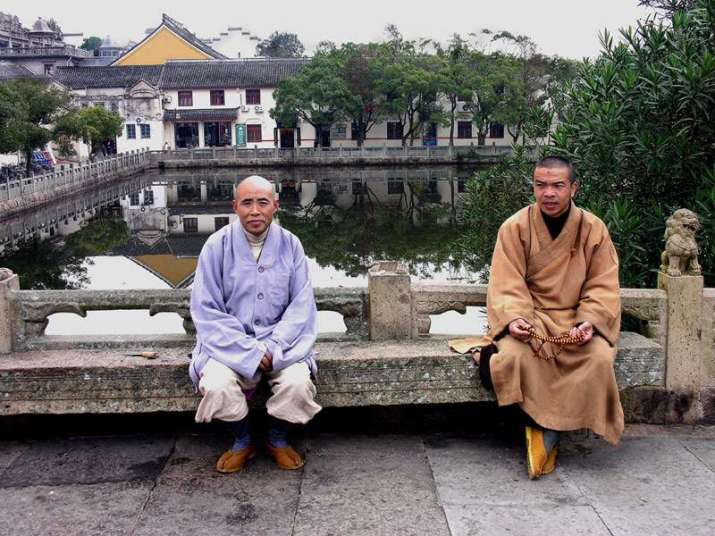
After the Putuo IPO was first proposed in 2012, State Administration of Religious Affairs offical Liu Wei emphasized in a public statement that temples should operate as nonprofit organizations, serving the religious needs of the public. “Looking at other countries in the world, there are no other examples of religious sites listing publicly,” he told journalists. “There have to be boundaries in the development of a market economy.” (Time)
However, the operators of religious tourism destinations argue that market listings are a necessity to generate the funds needed to develop and maintain sites that draw hundreds of thousands of visitors each year. In an interview, the head of Putuo Shan’s tourism office said that funds raised from the share sale would be used to improve accommodation, transportation, and other tourist amenities on the island.
“China’s Buddhist mountains have been involved in this commercialization wave one by one. We can expect to see the Taoism mountains be dragged into this wave soon,” the vice chairman of the Buddhism Association of Henan Province, Yan Can, said via social media in response to the Putuo Shan IPO proposal. “It will be a moral tragedy for everyone.” (The Wall Street Journal)
Since the Communist Party of China began easing restrictions on religion in the 1980s, there has been renewed interest in religion in general and in Buddhism in particular. With the more recent boom in domestic tourism, many temples, regional officials, and businesspeople have recognized opportunities to make a profit. New Buddhist sites targeting domestic tourists have sprung up throughout the country. Meanwhile, many temples and religious sites are commercializing some of their services to fund maintenance and operating costs, since government support for religion has diminished and income from donations is often insufficient.
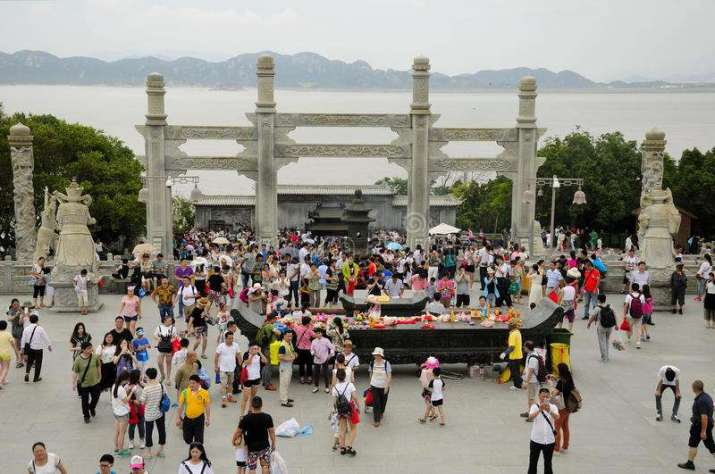
* The Four Great Mountains of Buddhism (四大佛教名山) are:
• Wutai Shan (Five-terrace Mountain) in Shanxi Province—home of Manjushri, the bodhisattva of wisdom, known in Chinese as Wenshu.
• Emei Shan (High and Lofty Mountain) in Sichuan Province—abode of the bodhisattva Samantabhadra, known in Chinese as Puxian Pusa.
• Jiuhua Shan (Nine Glories Mountain) in Anhui Province—dedicated to the bodhisattva Kshitigarbha, known in Chinese as Dizang.
• Putuo Shan (普陀山; Mount Potalaka) in Zhejiang Province—abode of the bodhisattva Avalokiteshvara, known in Chinese as Guan Yin.
** Controversy-plagued Abbot of Shaolin Monastery Comes under Official Scrutiny (Buddhistdoor Global)
See more
Buddhist activists halt Chinese holy mountain IPO (Financial Times)
For China’s Buddhist Monks, an IPO Too Far (Bloomberg)
IPO on Buddhist mountain makes business of religion (China Daily)
Pure Lands? China’s Sacred Mountain IPO Wave (The Wall Street Journal)
The Price of Faith: Chinese Buddhist Sites Plan IPOs (Time)










